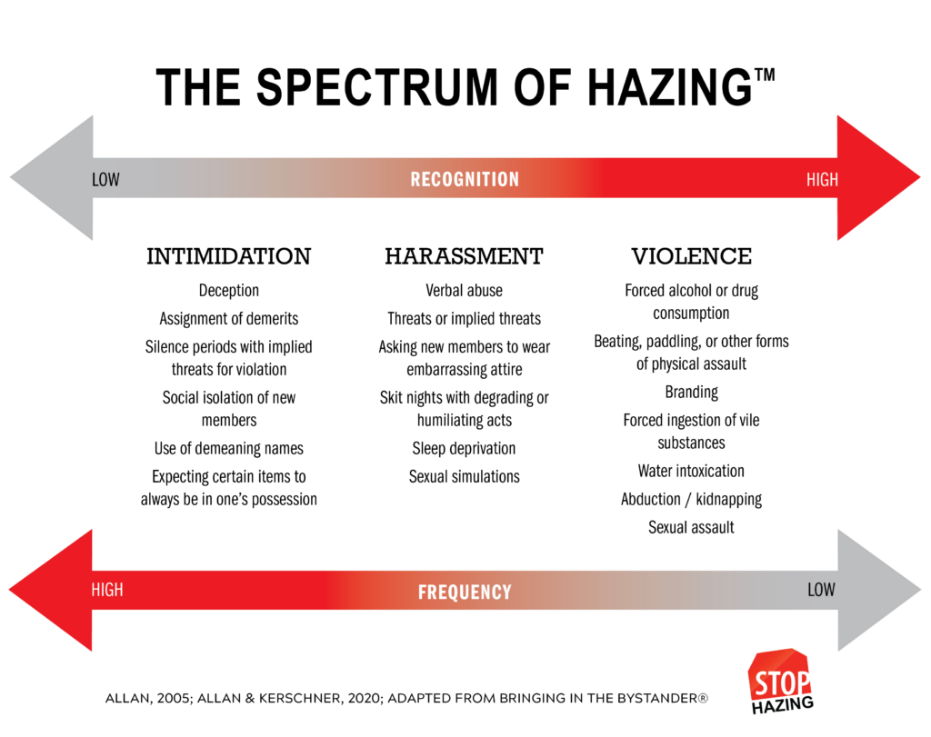
How do you know its hazing?
It may seem or be described that some activities seem harmless or are a longstanding tradition within the organization, it could still be hazing. If you are unsure, you can ask yourself the following questions to help determine if an activity is likely to be hazing:
- Are all members participating in this activity or is it “only” for certain members of the organization?
- Is there a question whether this activity can be conducted safely or if there is a risk of injury?
- Would you freely discuss the contents of the activity with your parents, professor, or other University staff members?
- Is the use of alcohol or drugs involved during this activity?
- Does the activity intentionally cause pain or emotional harm to the individuals participating?
- If a photo or video of the activity surfaced on social media or in the Tallahassee Democrat, would you feel embarrassed, upset, or ashamed?
If the answer to any of these questions is “yes”, the activity is likely to be hazing.
What is the Amnesty Policy?
The Medical Amnesty Policy encourages responsible behavior by ensuring students can seek medical help without fear of disciplinary action because of a hazing incident, sexual misconduct, intoxication, or medical emergency from alcohol and other drugs.
FSU’s Amnesty section of the Student Code of Conduct applies a waiver of student conduct process disciplinary action in which individuals may be eligible for amnesty consideration. This policy does not grant automatic “full immunity” to a student who acts under Amnesty.
Students may qualify for Amnesty should they take the following steps:
- SEEK Help: Call 9-1-1 or FSU Police Department if on campus (850) 644-1234
- STAY: Remain with the person needing assistance until the emergency responders arrive
- SHARE: Provide emergency responders with as much information as possible including the amount/dose of substances consumed
Frequently Asked Questions
Q. Is hazing against the law in Florida?
A. Yes, hazing is against the law in the state of Florida and is a criminal offense. A person commits hazing, a first degree misdemeanor, when he or she intentionally or recklessly commits any act of hazing upon another person who is a member of or an applicant to any type of student organization and the hazing creates a substantial risk of physical injury or death to such other person. A person commits hazing, a third degree felony, when he or she intentionally or recklessly commits any act of hazing upon another person who is a member of or an applicant to any type of student organization and the hazing results in serious bodily injury or death of such other person.
Q. Can I get in trouble for reporting hazing?
A. Our top priorities at Florida State University are student safety and well-being. To maintain a safe and well community, FSU encourages students to report hazing or any kind of violations that may threaten the safety and wellbeing of its members. You can make a report using report.fsu.edu.
We support a safe and inclusive environment by encouraging students and student organizations to take immediate action in seeking medical attention for individuals who need medical care. If you are in a situation and someone needs medical attention during a hazing activity, you may qualify for amnesty, but you must call 911 and cooperate with law enforcement or administer aid to the victim. Amnesty does not grant automatic “full immunity” to a student who acts under amnesty.
Q. What can happen to my organization if we haze (are found responsible for hazing)?
A. Students and student organizations that are found responsible for hazing are subject to the full range of the law and full range of sanctions set forth in the Student Code of Conduct which may include suspension and permanent dismissal from FSU. Student organizations may lose recognition or face separation/dissociation from FSU.
Q. What can happen if the person being hazed consents to participating in the hazing activity?
A. An individual’s consent to the activity in question is not a defense to a charge of hazing. The “choice” an individual may have is typically offset by peer pressure and power dynamics that exist within the organization.



